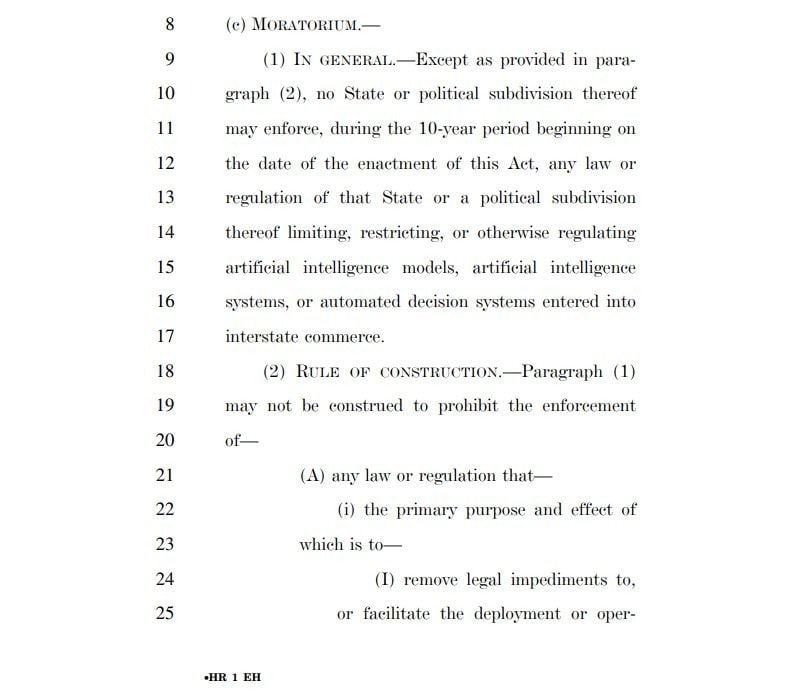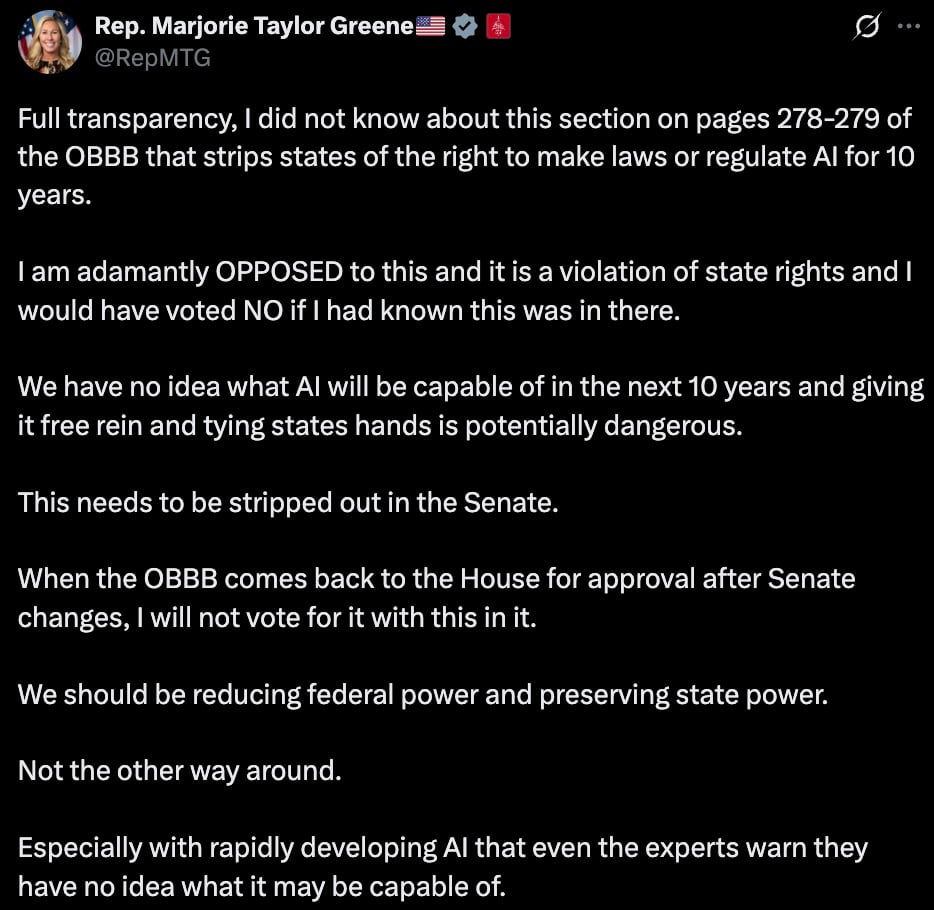Efforts by states to establish oversight of artificial intelligence may soon face a sweeping federal roadblock. Buried within President Donald Trump’s expansive legislative proposal, nicknamed the “Big Beautiful Bill,” is a measure that would halt both current and future state laws aimed at regulating AI. The provision is part of a broader $500 million initiative to revamp federal infrastructure using automation and machine learning over the next decade.
If enacted, the legislation would invalidate AI governance already passed by dozens of states and prevent new measures from being introduced at the state level.
The bill reads:
“No State or political subdivision thereof may enforce any law or regulation regulating artificial intelligence models, artificial intelligence systems, or automated decision systems during the 10-year period beginning on the date of the enactment of this Act”
This sweeping preemption is causing concern among lawmakers and public interest groups who see state-level action as vital in the absence of comprehensive federal oversight.

Passed in the House by a single vote on May 22, the bill is now with the Senate. Republican leaders are pushing for a July deadline to finalize the legislation and sidestep a debt ceiling crisis, but internal party disagreements persist.
Much of the discord centers on provisions unrelated to AI, such as healthcare, taxation, and national debt. Still, the AI regulation ban has become a flashpoint.
Currently, the federal government lacks a unified framework to govern artificial intelligence, leaving states to fill the gap with a mosaic of policies. In the previous administration, the Biden White House had introduced a controversial AI Bill of Rights, now defunct, that encouraged agencies to assess the risks and societal impacts of AI tools. That effort has since been replaced by a federal strategy more closely aligned with rapid deployment and innovation.
Meanwhile, state legislatures are showing no signs of slowing down. According to the National Conference of State Legislatures, more than 45 states along with Puerto Rico, the Virgin Islands, and Washington, D.C., introduced AI-related legislation in 2024. Over 30 of them passed new laws, and dozens more are considering proposals this year.
Some states, including Utah, Maryland, and Florida, have already passed sweeping AI oversight measures. Across the country, legislative sessions remain active, with multiple bills still under review.
Rep. Marjorie Taylor Greene (R-Ga.), who voted for the bill, has demanded the removal of the provision. Greene took to X on Tuesday to express her frustration, writing, “Full transparency, I did not know about this section on pages 278-279 of the OBBB that strips states of the right to make laws or regulate AI for 10 years. I am adamantly OPPOSED to this and it is a violation of state rights and I would have voted NO if I had known this was in there.”

Greene warned that handing unchecked power to AI without allowing states to intervene for a decade could be risky. “We have no idea what AI will be capable of in the next 10 years and giving it free rein and tying states hands is potentially dangerous,” she added.
Supporters of the moratorium argue that a uniform federal framework is necessary to avoid a patchwork of conflicting state laws that could stifle innovation.
They emphasize that inconsistent regulations would place a heavy compliance burden on startups and major tech firms alike, potentially slowing development in areas like machine learning, and automated systems. A single standard, they contend, gives developers a clearer runway to build and scale.
On the free speech front, proponents also point to the risk of states using AI laws to impose ideologically driven restrictions on what content algorithms can show or suppress. By centralizing authority, they argue, the federal government may help protect against state-level censorship, particularly in politically polarized environments where local laws could reflect partisan agendas. But this could also work the other way if states decide to introduce restrictions on what is permissible.
Opponents see the moratorium as a dangerous preemption of state authority, one that could have consequences for both privacy rights and democratic accountability. States have historically led the way in consumer protection, and many (including California and Illinois) have passed or proposed legislation addressing biometric data use, algorithmic bias, and AI-driven surveillance. For these states, the moratorium would halt the enforcement or development of regulations designed to protect residents’ personal data and civil liberties.
Privacy advocates warn that a decade-long freeze could leave individuals vulnerable to invasive uses of AI in policing, hiring, housing, and public services; especially if federal rules take years to materialize. Yet, others caution that the same state powers could also be used to expand surveillance and social control, depending on the political climate. The absence of federal preemption could allow states to experiment with aggressive AI tools in law enforcement or public monitoring, with limited oversight.
The same duality applies to free speech concerns. While some states may seek to curb corporate censorship and ensure algorithmic neutrality through new laws, others could pass laws that pressure platforms to prioritize or suppress certain viewpoints; effectively using AI regulation as a tool to shape public discourse. However, the First Amendment still stands.
Whether the absence of state regulation leads to more freedom or more control depends largely on who wields that power, and to what end.



